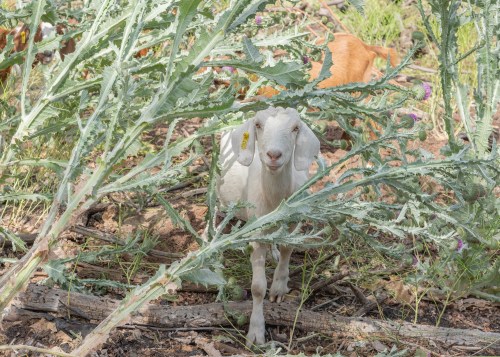Hooves on the ground: Goats join Pendleton wildfire prevention effort this dry season
Published 7:00 am Friday, June 27, 2025

- More than 600 goats roam a golden, brush-covered slope on June 25, 2025, at the Third Street Interchange on South Hill in Pendleton. Their mission: to clear overgrown vegetation and dry fuels, reducing wildfire risk as temperatures climb. (Yasser Marte/East Oregonian)
PENDLETON — As Eastern Oregon braces for a dry summer and heightened wildfire risk, the Pendleton Fire Department has enlisted an unlikely ally: goats.
These four-legged firefighters graze on dry brush, clear invasive plants and reduce the need for herbicides and heavy machinery. This year, they’re taking on a new role in wildfire prevention—wearing the Pendleton Fire Department hat, so to speak, as part of the city’s growing mitigation efforts.
On Tuesday afternoon, June 25, more than 600 goats spread across a golden, brush-covered slope at Third Street Interchange on South Hill. Under a clear sky, they chomped through tall, dry grass and shrubs. Their mission is simple: clear out overgrown vegetation and dry fuels to help reduce wildfire risk as temperatures rise.
This group is just part of a larger herd of about 700 goats working across Pendleton to help reduce fire hazards.
The fire department is using multiple grants to reduce wildfires, including a $55,000 funding from the Community Wildfire Risk Reduction Program, a grant administered through the Oregon State Fire Marshal’s Office. The program specifically supports the use of goats to clear vegetation, allowing them to graze and reduce fuels across approximately 100 acres.
Pendleton Assistant Fire Chief Valorie Tomren leads a wildfire mitigation project using a map created by Lt. Mark Easley that identifies hazardous areas across the city and highlights locations with a history of major fires.
The plan divides Pendleton into 13 sections and groups them into three treatment categories: grazing goats, hand crews and mowing. Each method targets the reduction of dry vegetation and other wildfire fuel sources. Tomren noted that the goats won’t eat the grass if it’s too dry and there is no nutritional value, so they may not get to all the areas.
Tomren said the department makes sure property owners are notified when goats will be grazing near their land, since crews try to stay on easements, noting most homeowners appreciate the help clearing steep, hard-to-mow terrain.
“Most property owners say, ‘Yes, please, have the goats eat up to my fence line on my property,’” Tomren said. “They’re very happy to have the goats come. The biggest reward on this project is seeing people’s faces when the goats are around.”
Tomren said goats consume much more dry vegetation than expected. While they don’t clear all the brush, they graze it down to the ground, significantly reducing fire hazards. She added that using goats is an environmentally friendly way to cut fuels compared to burning and poses no real hazards.
As temperatures rise and humidity drops, Pendleton Fire Chief Tony Pierotti said it takes far less to ignite a wildfire during an especially dry season.
Something as simple as a trailer dragging a chain behind a truck can spark spot fires along highways, and dry lightning striking from the sky increases the threat, creating a highly volatile environment, he said.
“We’re at the point in the season where we really can’t mow anymore,” he said. “But the goats are still out there for a little longer. A lot of the goats you’ve seen around town are part of our wildfire mitigation effort and they’re helping cut down the fuel load.”
Although goats help reduce wildfire risk, Tomren encouraged property owners and the public to maintain their land. She said those with tall weeds or other fire hazards should keep their properties clear as best they can.
“We’re happy to help but we hope property owners will take over and continue maintaining their land,” she said. “That way, if we receive another grant, we can use it to help a different landowner or support another project.”
Tomren added that even if grant funding ends in the future, the community will remain safer if everyone does their part.







